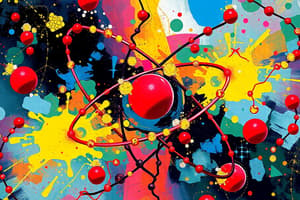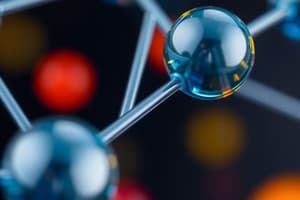Podcast
Questions and Answers
What is the basic unit of all matter according to chemistry?
What is the basic unit of all matter according to chemistry?
- Neutrons
- Atoms (correct)
- Molecules
- Protons
Which of the following describes the atomic structure involving protons, neutrons, and electrons?
Which of the following describes the atomic structure involving protons, neutrons, and electrons?
- Quantum mechanics (correct)
- Electromagnetism
- Thermodynamics
- Newton's laws
Compounds differ from individual elements by being:
Compounds differ from individual elements by being:
- Electrically charged
- Chemically unstable
- Physically similar
- Chemically and physically different (correct)
How do atoms bind together to form molecules?
How do atoms bind together to form molecules?
In chemistry, what principle states that elements can exist in mixtures without any chemical combination between them?
In chemistry, what principle states that elements can exist in mixtures without any chemical combination between them?
What does a balanced chemical equation represent?
What does a balanced chemical equation represent?
Which of the following is an example of an application of chemistry mentioned in the text?
Which of the following is an example of an application of chemistry mentioned in the text?
What is one of the essential roles that chemistry plays in agriculture?
What is one of the essential roles that chemistry plays in agriculture?
How has chemistry contributed to modern technology and electronics?
How has chemistry contributed to modern technology and electronics?
What aspect of substances and their transformations does chemistry provide insights into?
What aspect of substances and their transformations does chemistry provide insights into?
Flashcards are hidden until you start studying
Study Notes
Science: Discovering Our World Through Chemistry
From understanding the fundamental structure of atoms to developing groundbreaking medicines, science is a vast field with numerous disciplines. One such discipline is chemistry, which explores the composition, properties, and reactions of matter. In this article, we'll delve into the fascinating world of chemistry and how it contributes to our understanding of science.
Atomic Structure and Chemical Bonding
Chemistry starts with the smallest building blocks of all matter—atoms. These tiny particles make up everything around us, from the air we breathe to the food we eat. Atoms have a nucleus containing protons and neutrons, surrounded by electrons orbiting in shells according to certain rules known as quantum mechanics. This atomic structure forms the basis of chemical bonding, where two or more atoms bind together to form molecules through sharing or exchanging electrical charges.
Elements, Compounds, and Mixtures
The periodic table lists over 100 elements, each represented by a unique symbol composed of one or two letters representing its name or origin. As per Stokes Law of Proportionate Composition, when two different elements combine chemically, they produce compounds that differ physically and chemically from their individual components. Additionally, elements can also exist in mixtures without any chemical combination between them, as per Dalton’s principle.
Reactions and Equations
In chemistry, reactants interact to create products via reactions, following specific patterns and principles. A balanced chemical equation represents these interactions, showing the number of moles of reactant equal to the product. For instance, burning methane gas produces carbon dioxide and water, as shown in the combustion reaction below: [ CH_4 + 2O_2 \rightarrow CO_2 + 2H_2O ].
Applications of Chemistry
Behind everyday discoveries like plastics, textiles, pharmaceuticals, agricultural chemicals, and even computers, there lies a deep recognition of chemistry's role in society. Medicinal chemistry has been instrumental in creating antibiotics, vaccines, pain relief agents, anticancer drugs, and other life-saving medications. Agriculture relies heavily on artificial fertilizers, pesticides, and herbicides developed using concepts from soil chemistry. Moreover, modern technology and electronics rely on materials created through advanced chemical knowledge.
In summary, chemistry is woven intrinsically into the fabric of science, providing insights into the nature of substances and their transformations under various conditions. Its applications span diverse fields, illustrating the profound influence chemistry has had and continues to have on human civilization.
Studying That Suits You
Use AI to generate personalized quizzes and flashcards to suit your learning preferences.




